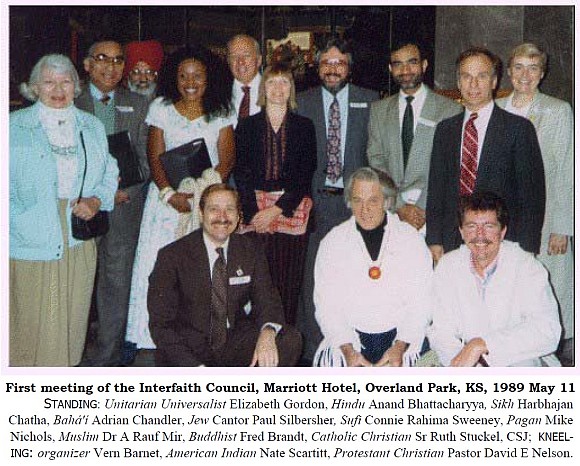| WEDNESDAY MAY 13 2020
MAN OF FAITH
Paul Silbersher, who died April 26, was a beloved
cantor and rabbi who had a passion for teaching
BY BETH LIPOFF
Special to The Star
Another was his commitment
to religious, interfaith
and social justice
programming.
Silbersher was “a colleague
who would always
embrace the notion of
doing more than what
they were asked, even if
that meant sometimes I
had to say, ‘Don’t do anymore,’”
Zedek said.
He also loved learning.
Silbersher would get up at
6 a.m. to tutor children in
Rabbi, cantor, police
chaplain, social worker,
naval reservist, tennis pro:
Paul Silbersher’s lifetime
resume was filled with an
impressive range and
number of jobs and duties.
The former spiritual
leader of Congregation
Kol Ami and Temple Sinai
died April 26 at the age of
90. He was the first rabbi
for both of those congregations.
He came to Kansas City
in 1979 after serving in
Connecticut and New
York for two decades. For
the next 21 years, he was
the cantor for The Temple,
Congregation B’nai
Jehudah in Overland Park.
Those who knew and
loved him often mention
his unforgettable voice.
People who first encountered
him in his role
as cantor were “understatement
— overwhelmed
by the power of his voice
and the emotional range
in his singing,” said Rabbi
Michael Zedek, who was
senior rabbi at B’nai Jehudah
when Silbersher was
its cantor.
Capt. James Sutterby of
the Overland Park Police
Department, where Silbersher
was a chaplain for
10 years, echoed Zedek’s
sentiment: “He had a
voice that when he said a
prayer, it just penetrated
your heart,” he said.
It’s a good quality for a
cantor — a Jewish musical
leader — to have.
Ricky Silbersher, the
oldest of his four children,
said that voice was a key
part of his presence.
“As a Jewish spiritualist,
I’ve never heard a more
sincere and profound
voice,” she said.
Silbersher was married
three times. Ricky Silbersher
said it was his
second wife, Sherry Beckman,
who helped him
decide to move to Kansas
City while he was also
considering job offers
from congregations in
Toronto, Curacao and
California. He later married
former Shawnee Mission
School District superintendent
Marjorie Kaplan.
The community here
became very important to
him, and he to it.
“Wherever he went, he
created community. … I
couldn’t believe how
many cards and letters I
found of love and endearment
and gratitude (in his
home),” Ricky Silbersher
said. “So many people
loved him: layers and
layers of people who
adored him and he
touched in a deep and
profound way.
“People felt he was
irreplaceable, and he
changed their lives.”
One outlet of his desire
for community was developing
the short-lived Hope
Academy charter school in
Kansas City. Another was
serving as a police chaplain.
He felt so strongly
about his work as a chaplain
that in the last days of
his life, he only wanted to
wear his departmentissued
chaplain shirts and
requested that one be
buried with him.
bar or bat mitzvah studies
before school with “an
immeasurable amount of
patience,” Ricky Silbersher
said. He tutored his
granddaughter, Scout,
who lives in Australia, for
her bat mitzvah via Skype.
“He never stopped
learning, and he never
stopped sharing learning.
He absolutely loved the
world of ideas and enjoyed
the company of
others in that realm. He
also was limitlessly engaged
in the desire to
make connections of the
heart — a heck of a combination,”
Zedek said.
His daughter said he
even wove his passion for
tennis into teaching. In
the ’60s and ‘70s, he
spent many summers as
the head tennis pro at
clubs in the Northeast.
“He’d teach tennis
through the day, then
Friday night he’d go to
shul — temple — and he’d
sing, and Saturday and
Sunday, he’d go to Sunday
school,” Ricky Silbersher
said.
Although he spent a lot
of his time on serious
pursuits, Silbersher also
found a lot of humor in
life.
“He could see the absurdity
and silliness in lots
of situations, could make
up a song parody at the
drop of a note. He was not
a joke-teller. He was just
able to see the nuances of
what we sometimes refer
to as the human comedy,”
Zedek said.
A talented mimic himself,
one of his own favorites
to watch was Mel
Brooks’ 2,000-year-old
man routine.
“He loved more than
anything a good belly
laugh,” Ricky Silbersher
said. “When he was dying,
I played (the Mel Brooks
routine) next to the bed.
He was really fragile, and
he had a laugh — I knew it
would hurt — but he let
himself laugh so he could
feel the laugh in his
chest.”
Because of the current
restrictions on gatherings,
just a couple of family
members were allowed to
be there when he was
buried in New Jersey.
Ricky Silbersher said a
public memorial service
will be held in the Kansas
City area on his yahrzeit —
the anniversary of his
death — next year on April
25.
https://www.kcjc.com/index.php/current-news/latest-news/6072-remembering-the-life-of-cantor-paul-silbersher
Rabbi Paul C. Silbersher
April 23, 1930 - April 26, 2020
https://www.louismemorialchapel.com/obituaries/Paul-Silbersher/
Back to CRES index page.
|

